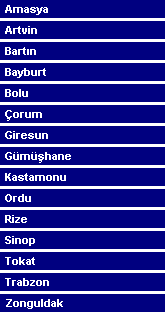| Trabzon... |
|
Trabzon is said to be founded in the 7th century BC by Miletion colonists and then Alexis Comnenes founded the
Comnenos Empire, which lasted until 1461 when the Ottomans took over the area. The city is now an important port of trade,
continuing its role throughout the history. Sultan Suleyman the Magnificent was born here and Yavuz Sultan Selim, another
Ottoman sultan, was the regional governor of Trabzon when he was a prince. The city is mostly situated on a table like
promontory above the harbor. The citadel is one of the oldest remains, and the first thing you will notice when entering
Trabzon, is a well-preserved 13th century Byzantine Church, now restored as the Ayasofya Museum. The walls of
this church are decorated with frescoes which are the finest examples of Byzantine craftsmanship. The Fatih Mosque in the
city was once a Byzantine church. Trabzon is very richly adorned with sightseeing areas and precious remains from the
Byzantine period. On the western slopes of the Boztepe hill, is "the Boztepe Park" with a beautiful view of the
city. In the village of Surmene, to the east of Trabzon, is a fascinating 19th century mansion, known as the
Kastel. There are many opportunities in Trabzon to cover all tastes. For example the Erikbeli and Karadag meadows, south
of Akcaabat, are quite good hiking and picnicking areas. Taking a northeasterly direction towards the inner parts of
Trabzon and following a delightful mountain road, you can visit the pretty mountain village of Hamsikoy and taste its
delicious meals, before reaching the Zigana Tunnel, which is the largest tunnel in Turkey. Then you may head for the
Zigana Ski-Center to feel the real joy of skiing, or for Gurgenagac, Kirazli and Solma which are excellent meadows with
magnificent landscapes and pure clean air, for outdoor activities in the palm of nature. The most appealing and breathtaking
sightseeing area of Trabzon is the Altindere National Park. 47 kms southeast of Macka, this lovely park provides a
fascinating setting for the 14th century Sumela Monastery of the Virgin Mary, which is perched on the rock
face 270 metres above the valley, at an altitude of 1300 metres. Within the ruins of the monastery are the remains of
magnificent frescoes. It is a place of exceptional natural beauty. It was initially constructed on the steep surface of
rock, as a small church in the 4th century. In the 11th century it was expanded into a monastery
with 72 cells.
|
|

|


 462...
462...
 61...
61...
 979,295...
979,295...
 6,685...
6,685...
 39 E 43 - 41 N 00...
39 E 43 - 41 N 00...






